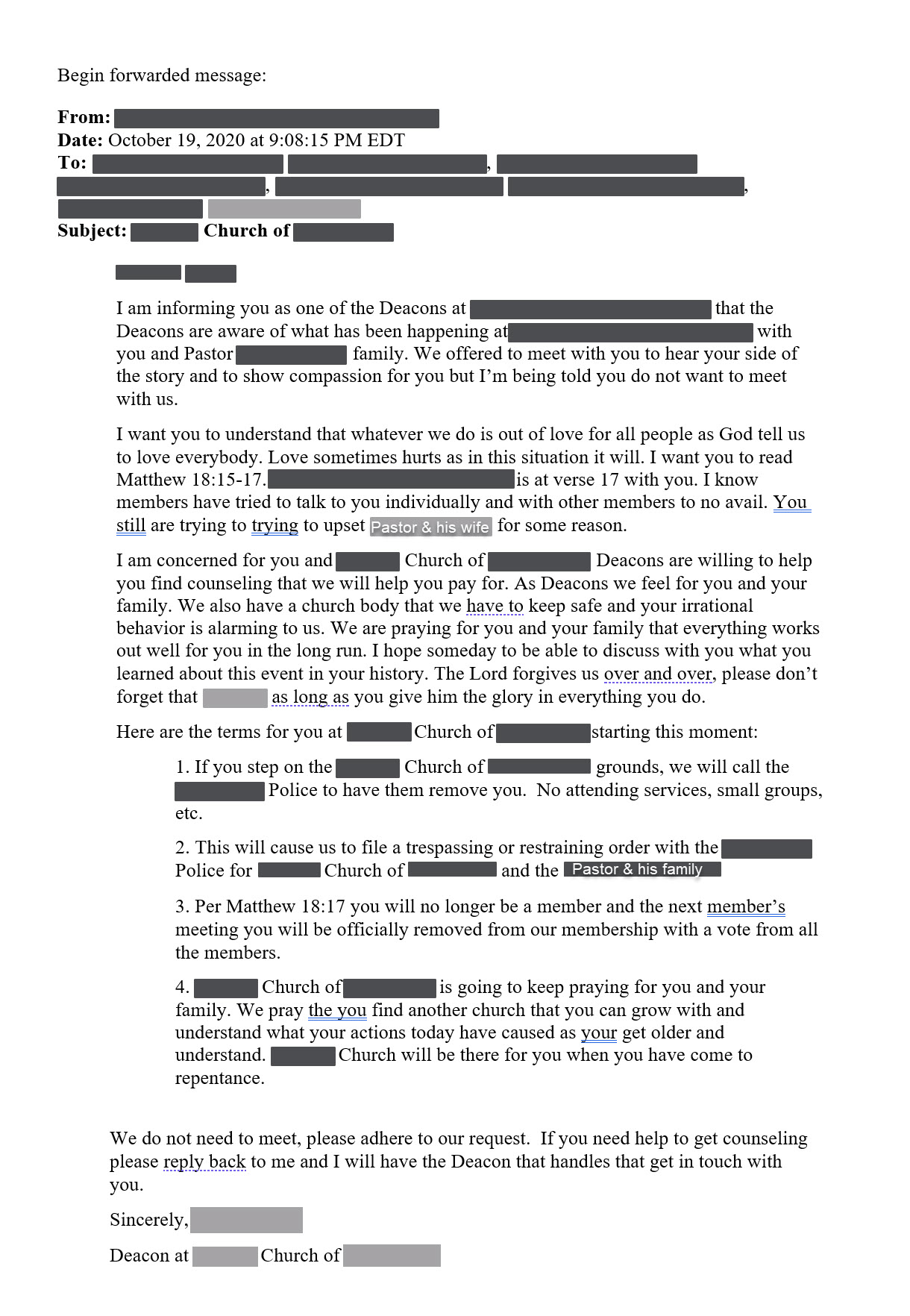When people speak of trauma or betrayal, they often point to situations involving family conflict, broken friendships, or workplace politics. But increasingly, individuals are naming a different source of pain—the church.
This is particularly difficult to process, because the church is not merely a social organization; it is a spiritual community, often tied to a person’s deepest convictions, values, and sense of identity. So when rejection, exclusion, or judgment takes place within this context, it isn’t just emotionally painful—it can become spiritually disorienting.
What follows is shaped by true events—decisions that were made, words that were spoken, and the impact they left behind. The purpose isn’t to relive the pain but to redeem it. What can we learn from what went wrong, and how can the Church do better next time?
While betrayal from a coworker or conflict with a neighbor may sting for a season, church betrayal strikes at the level of soul. And often, it leaves the person not just doubting the church—but doubting their place in it.
Quiet Decisions and Procedural Exile
The story that follows began, like many do, with the appearance of care. A female church member was involved in discipleship relationships, faithfully attended services, and had even participated in ministry life. There was no public scandal, no doctrinal rebellion, no church-wide outcry.
And yet, behind closed doors, leadership conversations had already shifted. Accusations were being discussed. Decisions were being made. But the individual in question wasn’t part of those conversations.
By the time a meeting was called, the outcome had already been determined. The member was not being invited into restoration but being quietly processed for removal. One male leader opened the meeting by stating:
“The purpose of this meeting is for the deacons to decide whether we will recommend… to remove you from [church] membership at our next members meeting.”
That moment revealed what many who experience church hurt already know: sometimes the process isn’t pastoral—it’s procedural. And when procedure outweighs relationship, what should be shepherding can become silent exile.
Another concerning moment occurred when a supporting family member asked for clarification about what specific behavior was considered “unsafe?” in response to their accusation. The question was dismissed mid-sentence, and one male deacon redirected the conversation without ever naming a concrete action.
These patterns matter. Not because they are rare—but because they are far too common.
Often, church-based harm isn’t loud. It’s not abusive in the way the world expects. It comes wrapped in calm voices, strategic meetings, and spiritual language. But the effect is the same: someone who once belonged now leaves confused, shamed, and silenced.
Scripture That Speaks to Spiritual Betrayal
Scripture does not turn a blind eye to betrayal within spiritual communities. In fact, some of the most heartbreaking examples of relational collapse happen not between strangers, but among those who shared covenant, table, and trust.
The psalmist lamented:
“For it is not an enemy who reproaches me, then I could bear it… But it is you, a man my equal, My companion and my familiar friend; We who had sweet fellowship together walked in the house of God in the throng.” — Psalm 55:12–14
The pain of betrayal is intensified when it comes from within the house of God. And this is not merely an Old Testament theme. In the Gospels, Jesus Himself was betrayed by one of His disciples—someone who had walked with Him, learned from Him, eaten beside Him, and even been entrusted with responsibility.
“Truly, truly, I say to you, that one of you will betray Me.” — John 13:21
The betrayal of Jesus was not carried out by Rome, but by someone inside His own circle. And yet, He did not retaliate. He did not shout. He did not shame. He simply acknowledged the truth, endured the pain, and fulfilled His redemptive mission.
These passages serve as a sobering reminder: spiritual betrayal is real, and it is not outside the scope of Scripture. What’s more, they affirm that Jesus understands this kind of wound—not just in theory, but through experience.
In moments when church hurt leads to doubt or disillusionment, this truth remains:
“The Lord is near to the brokenhearted and saves those who are crushed in spirit.” — Psalm 34:18
God does not retreat from those wounded by His people. He draws near.
What the Gospel Says to the Wounded
If betrayal within the church is possible—and even found in Scripture—then it must also be true that healing is possible within God’s design.
The presence of spiritual harm does not erase the integrity of Christ. The failure of leaders does not cancel the faithfulness of Jesus. The dysfunction of a system does not undo the heart of the Gospel.
And while Scripture does not shy away from showing us failure, it also shows us how God restores. The same Jesus who was betrayed, abandoned, and falsely accused became the source of grace for the very people who failed Him.
The Church does not need to deny its capacity to wound. It needs to confess it—and grow from it. That is how trust is rebuilt. That is how safety is cultivated. That is how the wounded begin to heal.
And perhaps most importantly, those who have been harmed must hear this clearly:
Your pain is not evidence that your faith has failed. It may be the very place where God begins to show you who He truly is.
Think It Through
- Have I ever felt dismissed or wounded by people in spiritual authority? How did that impact my view of God?
- What expectations do I place on the church that may need to be revisited in light of Scripture?
- In what ways have I allowed human failure to shape my spiritual identity?
- What does it mean to trust God again—even if I’m still healing from what His people did?
Break Point Collection
This article is the first in a multi-part series exploring the emotional, spiritual, and structural dynamics of church-based harm—and how we can move toward healing and restoration. In the next article, we’ll explore that quiet shift many experience—the moment when something just doesn’t feel right anymore.
If you’ve ever questioned what your heart was trying to tell you, don’t miss the next part: “The Moment I Realized Something Was Off.”
Receipts

✂️ Parts of this email are blacked out — not to hide, not to protect the guilty, and not because I’m afraid.
I redacted this because I don’t want us to lose sight of the heart of the matter. This isn’t about dragging names through the mud. It’s about shining a light on what really happens when church leaders wound instead of heal.
These are the real words that were sent. This is a true story. These are the receipts. 📩
I’m sharing this not for vindication, but for healing. Not to focus on who did it, but on what was done, why it matters, and how we can move toward restoration.
Devotional Song
Listen before, during and after reading the devotional.











Recent Comments